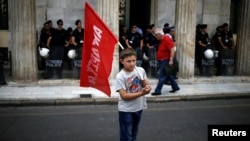The U.N. refugee agency reports a multi-million-dollar appeal begun early this year on behalf of tens of thousands of refugees and migrants in Greece and along the Balkan route is outdated and needs to be revised upwards.
The U.N. refugee agency and 60 partner organizations appealed for about $555 million in January. The money was supposed to be enough to carry out Greek and Balkan aid operations until the end of the year.
Since the appeal was launched, however, radical changes have occurred. UNHCR spokesman William Spindler said the so-called regional Refugee and Migrant Response Plan has been revised to take into account the new circumstances; namely, border closures along the western Balkans route and the enactment of the EU-Turkey agreement.
“The financial requirements to implement the plan have been adjusted to reflect the change in circumstances, he said. "They currently stand at almost $670 million for 2016, of which contributions of $328.8 million have been received.”
That, said Spindler, leaves a gap of more than $340 million. The UNHCR reports a significant drop in refugees and migrants arriving in Greece. That has resulted in a decrease in the number of people along the western Balkans route and an increase in the number of people remaining in Greece.
Spindler said more than 57,000 refugees and migrants currently are spread across the country. As a consequence, he said the UNHCR and partners will focus their aid operations on the static population in Greece and on protecting people in the western Balkans.
“Unmet needs remain significant," he added, "as living conditions in the sites in Greece, both on the islands and in the mainland, have deteriorated as a result of congestion and the rapid nature in which sites were established on the mainland.”
Spindler said there are many people with specific needs, such as unaccompanied or separated children, pregnant or lactating women, the elderly and disabled.
Given the conditions under which these people are forced to live, he warned many are likely to rely on smuggling and trafficking networks, exposing themselves to greater risks.




